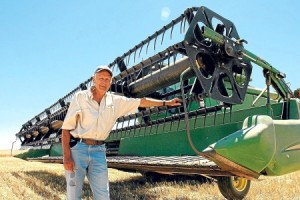Dr. Quick’s Knowledge Reaped World Harvests
Posted on June 24, 2015
Filed Under Communication, Technology | Leave a Comment
The vast range of human technical ingenuity is brought home, sadly, by the death of Dr. Graeme Ross Quick, an Australian whom most of us never heard of.
The Land, an Australian blog, advises that Dr. Quick “was an authority on harvesters, tractors and much more.” He died last month at the age of 79.
 An authority on harvesters? Don’t they just grind across a field, bringing in a crop? Not if you’re a farmer they don’t. They’re highly specialized pieces of technical equipment.
An authority on harvesters? Don’t they just grind across a field, bringing in a crop? Not if you’re a farmer they don’t. They’re highly specialized pieces of technical equipment.
What you come to know depends largely on where and how you’re raised, and what experiences and opportunities you’re exposed to. Dr. Quick was raised in Australia’s Victoria state and developed a fascination with farm equipment “on an uncle’s nearby farm where he helped stock sheaves and worked with a horse-drawn reaper and binder.”
Farm work “helped fund his studies for a University of Melbourne degree in mechanical engineering, also sparking a career-long interest in field equipment efficiency.” What you influence, thereby, is what you become increasingly attached to.
Graeme Quick and his wife, Marlene, moved with their three young boys to the U.S. in 1967, where he accepted an invitation to teach and study for a doctorate at Iowa State University. His later career took him to Norway, Canada, the Philippines (where he headed the International Rice Research Institute’s agricultural engineering division), and then to the United Nations Food and Agriculture Organisation (FAO). “His rice research and FAO projects,” the FarmOnLine writers add, “took him as far afield as Egypt, Pakistan, Bangladesh, Vietnam and Bhutan in the Himalayas.”
That all made him an international technical advisor in harvesting. Think how much of an increased yield resulted from his work! And he became the first Australian fellow of the American Society of Agricultural Engineers. Obviously, you don’t give accomplishments like these any thought if you’re not aware of them.
Finally, Dr. Quick received agricultural engineering’s highest recognition – the C.H. McCormick-J.L. Case gold medal “for meritorious contributions to the profession.”
How many such technically grounded men and women, largely unsung heroes and heroines of our times, do you know? Don’t you wish you knew more of them? Be alert to where they might be active in your field, and seek them out. In this Internet age, that’s becoming easier to do. You’ll grow together, harvesting wisdom. – Doug Bedell
Moreover, Writing Takes Time to Do Well
Posted on June 9, 2015
Filed Under Communication, Government, Technology, The Writing Life | Leave a Comment
Here’s Tom Johnson, the technical writer proprietor of “I’d Rather Be Writing,” trying to make amends – and offer cautions – for all our heedless brethren who aren’t so mindful that, after all, they’re dealing with human readers, even if they may have technical mindsets.
 Readers turn to a technical text to learn efficiently. But, too often, they’re imposed upon by writers who don’t take the time to be readily understood. Yes, coherent technical writing takes time, along with an understanding of its context.
Readers turn to a technical text to learn efficiently. But, too often, they’re imposed upon by writers who don’t take the time to be readily understood. Yes, coherent technical writing takes time, along with an understanding of its context.
The first thing we need to do, Tom notes, is to “decode complexity”. But if complexity is presented well, it can take less time to cope with – good technical writers take the time to save their readers time. (Their employers need to be mindful of that.)
Densely driven technical writers are prey to the main hazard of all heedless writers – they risk not being readily understood. Who would sit down to a keyboard these days and not want to be readily understood? Only reckless or inordinately pressurized souls. Be sure you own situation is fairly structured to allow you to read and write well. (Clue: Communication with managers may be required.)
Yet you also have to apply shoe leather. Part of being a good technical writer, Tom notes, is being an investigative reporter. You need to seek out information from its sources – the actual “doers” in your work setting.
“I set about asking engineers around me for information,” he writes. “Every time I talked to an engineer, I would get a firehose of useful information that would help me understand what was going on.” You’re there, basically, to slow down and aim the hose so that others don’t get sprayed with information.
Tom suggests that stepping through a task yourself, if you have the time, is a good idea – and you should have the time. (Again, supervisors please take note.)
And finally, the best advice: “Rest your brain. Sometimes,” Tom notes, “when I can’t figure something out, I sleep on it. In the morning, the answer comes to me.” Or simply take a break.” Indeed, a good cook will tell you that recipes can’t be rushed. Technical writing’s no different. – Doug Bedell
Recently
- Presentations With Forethought
- Technical Writing’s Lineage – Surely It’s Deeper than Digital
- At the Holidays, Twitting Amazon
- Successful Cookie Baking – From Mom, an Acknowledged Expert
- Slides for a Tech Writer’s Craft
- Digital or Not, Be Clear
- Being Watchful About Digital Designs…
- When Proposals Don’t Click, Keep Making Them Anyway
- Like a Good Gardener, Help an Enterprise Keep Itself Current
- We’re Leaders All, And Need to Think That Way
Categories
Archives
- January 2017
- December 2016
- November 2016
- October 2016
- September 2016
- August 2016
- July 2016
- June 2016
- May 2016
- April 2016
- March 2016
- February 2016
- January 2016
- December 2015
- November 2015
- October 2015
- September 2015
- August 2015
- July 2015
- June 2015
- May 2015
- April 2015
- March 2015
- February 2015
- January 2015
- December 2014
- November 2014
- October 2014
- March 2014
- February 2014
- January 2014
- December 2013
- November 2013
- October 2013
- September 2013
- August 2013
- July 2013
- June 2013
- May 2013
- April 2013
- March 2013
- February 2013
- January 2013
- December 2012
- November 2012
- October 2012
- September 2012
- August 2012
- July 2012
- June 2012
- May 2012
- April 2012
- March 2012
- February 2012
- January 2012
- December 2011
- November 2011
- October 2011
- September 2011
- August 2011
- July 2011
- June 2011
- May 2011
- April 2011
- March 2011
- February 2011
- January 2011
- December 2010
- November 2010
- October 2010
- September 2010
- August 2010
- July 2010
- June 2010
- May 2010
- April 2010
- March 2010
- February 2010
- January 2010